- Home
- C. L. Moore
No Boundaries Page 6
No Boundaries Read online
Page 6
“Then—something more’s to come?” Oliver only mumbled his question. He was not sure he wanted an answer. He had been curious so long, and now that knowledge lay almost within reach, something about his brain seemed to refuse to listen. Perhaps this weariness, this feverish, dizzy feeling would pass as the effect of the euphoriac wore off.
Cenbe’s voice ran on smoothly, soothingly, almost as if Cenbe too did not want him to think. It was easiest to lie here and listen.
“I am a composer,” Cenbe was saying. “I happen to be interested in interpreting certain forms of disaster into my own terms. That is why I stayed on. The others were dilettantes. They came for the May weather and the spectacle. The aftermath—well why should they wait for that? As for myself—I suppose I am a connoisseur. I fie for thetermath rather fascinating. And I need it. I need to study it at first hand, for my own purposes.”
His eyes dwelt upon Oliver for an instant very keenly, like a physician’s eyes, impersonal and observing. Absently he reached for his stylus and the note pad. And as he moved, Oliver saw a familiar mark on the underside of the thick, tanned wrist.
“Kleph had that scar, too,” he heard himself whisper. “And the others.”
Cenbe nodded. “Inoculation. It was necessary, under the circumstances. We did not want disease to spread in our own time-world.”
“Disease?”
Cenbe shrugged. “You would not recognize the name.”
“But, if you can inoculate against disease——” Oliver thrust himself up on an aching arm. He had a half-grasp upon a thought now which he did not want to let go. Effort seemed to make the ideas come more clearly through his mounting confusion. With enormous effort he went on.
“I’m getting it now,” he said. “Wait. I’ve been trying to work this out. You can change history? You can! I know you can. Kleph said she had to promise not to interfere. You all had to promise. Does that mean you really could change your own past—our time?”
Cenbe laid down his pad again. He looked at Oliver thoughtfully, a dark, intent look under heavy brows. “Yes,” he said. “Yes, the past can be changed, but not easily. And it changes the future, too, necessarily. The lines of probability are switched into new patterns—but it is extremely difficult, and it has never been allowed. The physio-temporal course tends to slide back to its norm, always. That is why it is so hard to force any alteration.” He shrugged. “A theoretical science. We do not change history, Wilson. If we changed our past, our present would be altered, too. And our time-world is entirely to our liking. There may be a few malcontents there, but they are not allowed the privilege of temporal travel.”
Oliver spoke louder against the roaring from beyond the windows. “But you’ve got the power! You could alter history, if you wanted to—wipe out all the pain and suffering and tragedy——”
“All of that passed away long ago,” Cenbe said.
“Not—now! Not—this!”
Cenbe looked at him enigmatically for a while. Then—“This, too,” he said.
And suddenly Oliver realized from across what distances Cenbe was watching him. A vast distance, as time is measured. Cenbe was a composer and a genius, and necessarily strongly empathic, but his psychic locus was very far away in time. The dying city outside, the whole world of now was not quite real to Cenbe, falling short of reality because of that basic variance in time. It was merely one of the building blocks that had gone to support the edifice on which Cenbe’s culture stood in a misty, unknown, terrible future.
It seemed terrible to Oliver now. Even Kleph—all of them had been touched with a pettiness, the faculty that had enabled Hollia to concentrate on her malicious, small schemes to acquire a ringside seat while the meteor thundered in toward Earth’s atmosphere. They were all dilettantes, Kleph and Omerie and the other. They toured time, but only as onlookers. Were they bored—sated—with their normal existence?
Not sated enough to wish change, basically. Their own time-world was a fulfilled womb, a perfection made manifest for their needs. They dared not change the past—they could not risk flawing their own present.
Revulsion shook him. Remembering the touch of Kleph’s lips, he felt a sour sickness on his tongue. Alluring she had been; he knew that too well. But the aftermath——
There was something about this race from the future. He had felt it dimly at first, before Kleph’s nearness had drowned caution and buffered his sensibilities. Time travelling purely as an escape mechanism seemed almost blasphemous. A race with such power——
Kleph—leaving him for the barbaric, splendid coronation at Rome a thousand years ago—how had she seen him? Not as a living, breathing man. He knew that, very certainly. Kleph’s race were spectators.
But he read more than casual interest in Cenbe’s eyes now. There was an avidity there, a bright, fascinated probing. The man had replaced his earphones—he was different from the others. He was a connoisseur. After the vintage season came the aftermath—and Cenbe.
Cenbe watched and waited, light flickering softly in the translucent block before him, his fingers poised over the note pad. The ultimate connoisseur waited to savour the rarities that no non-gourmet could appreciate.
Those thin, distant rhythms of sound that was almost music began to be audible again above the noises of the distant fire. Listening, remembering, Oliver could very nearly catch the pattern of the symphonia as he had heard it, all intermingled with the flash of changing faces and the rank upon rank of the dying——
He lay back on the bed letting the room swirl away into the darkness behind his closed and aching lids. The ache was implicit in every cell of his body, almost a second ego taking possession and driving him out of himself, a strong, sure ego taking over as he himself let go.
Why, he wondered dully, should Kleph have lied? She had said there was no aftermath to the drink she had given him. No aftermath—and yet this painful possession was strong enough to edge him out of his own body.
Kleph had not lied. It was no aftermath to drink. He knew that—but the knowledge no longer touched his brain or his body. He lay still, giving them up to the power of the illness which was aftermath to something far stronger than the strongest drink. The illness that had no name—yet.
Cenbe’s new symphonia was a crowning triumph. It had its premiere from Antares Hall, and the applause was an ovation. History itself, of course, was the artist—opening with the meteor that forecast the great plagues of the fourteenth century and closing with the climax Cenbe had caught on the threshold of modern times. But only Cenbe could have interpreted it with such subtle power.
Critics spoke of the masterly way in which he had chosen the face of the Stuart king as a recurrent motif against the montage of emotion and sound and movement. But there were other faces, fading through the great sweep of the composition, which helped to build up to the tremendous climax. One face in particular, one moment that the audience absorbed greedily. A moment in which one man’s face loomed huge in the screen, every feature clear. Cenbe had never caught an emotional crisis so effectively, the critics agreed. You could almost read the man’s eyes.
After Cenbe had left, he lay motionless for a long while. He was thinking feverishly——
I’ve got to find some way to tell people. If I’d known in advance, maybe something could have been done. We’d have forced them to tell us how to change the probabilities. We could have evacuated the city.
If I could leave a message——
Maybe not for today’s people. But later. They visit all through time. If they could be recognized and caught somewhere, some time, and made to change destiny——
It wasn’t easy to stand up. The room kept tilting. But he managed it. He found pencil and paper and through the swaying of the shadows he wrote down what he could. Enough. Enough to warn, enough to save.
He put the sheets on the table, in plain sight, and weighted them down before he stumbled back to bed through closing darkness.
The house was dynamited six da
ys later, part of the futile attempt to halt the relentless spread of the Blue Death.
THE DEVIL WE KNOW
FOR days the thin, imperative summons had been whispering deep in Carnevan’s brain. It was voiceless and urgent, and he likened his mind to a compass needle that would swing, inevitably, towards the nearest magnetic point. It was fairly easy to focus his attention on the business of the moment, but it was, as he had found, somewhat dangerous to relax. The needle wavered and swung imperceptibly while the soundless cry grew stronger, beating at the citadel of his consciousness. Yet the meaning of the message remained unknown to him.
There was not the slightest question of insanity. Gerald Carnevan was as neurotic as most, and knew it. He held several degrees, and was junior partner in a flourishing New York advertising concern, contributing most of the ideas. He golfed, swam, and played a fair hand of bridge. He was thirty-seven years old, with the thin, hard face of a Puritan—which he was notm><12;and was being blackmailed, in a mild degree, by his mistress. This he did not especially resent, for his logical mind had summed up the possibilities, arrived at a definite conclusion, and then had forgotten.
And yet he had not forgotten. In the depths of his subconscious the thought remained, and it came to Carnevan now. That, of course, might be the explanation of the—the “voice.” A suppressed desire to solve the problem completely. It seemed to fit fairly well, considering Carnevan’s recent engagement to Phyllis Mardrake. Phyllis, of Boston stock, would not overlook her fiancé’s amours—if they were dragged out into the open. Diana, who was shameless as well as lovely, would not hesitate to do that if matters came to a head.
The compass needle quivered again, swung, and came to a straining halt. Carnevan, who was working late in his office that night, grunted angrily. On an impulse, he leaned back in his chair, tossed his cigarette out the open window, and waited.
Suppressed desires, according to the teachings of psychology, should be brought out into the open, where they could be rendered harmless. With this in mind, Carnevan smoothed all expression from his thin, harsh face and waited. He closed his eyes.
Through the window came the roaring murmur of a New York street. It faded and dimmed almost imperceptibly. Carnevan tried to analyze his sensations. His consciousness seemed enclosed in a sealed box, straining all in one direction. Light patterns faded on his closed lids as the retina adjusted itself.
Voiceless, a message came into his brain. He could not understand. It was too alien—incomprehensible.
But at last words formed. A name. A name that hovered on the edge of the darkness, nebulous, inchoate. Nefert. Nefert.
He recognized it now. He remembered the seance last week, which he had attended with Phyllis at her request. It had been cheap, ordinary claptrap—trumpets and lights, and voices whispering. The medium held seances thrice a week, in an old brownstone near Columbus Circle. Her name was Madame Nefert—or so she claimed, though she looked Irish rather than Egyptian.
Now Carnevan knew what the voiceless command was. Go to Madame Nefert, it told him.
Carnevan opened his eyes. The room was quite unchanged. This was as he had expected. Already some vague theory had formed within his mind, germinating an annoyed anger that someone had been tampering with his most exclusive possession—his self. It was, he thought, hypnotism. Somehow, during the seance, Madame Nefert had managed to hypnotize him, and his curious reactions of the past week were due to post-hypnotic suggestion. It was somewhat far-fetched, but certainly not impossible.
Carnevan, as an advertising man, inevitably followed certain lines of thought. Madame Nefert would hypnotize a client. That client would return to her, worried and not understanding what had happened, and the medium would, probably, announce that the spirits were taking a hand. When the client had been properly convinced—the first step in advertising campaigns— soefert would show her hand, whatever she had to sell.
It was the first tenet of the game. Make the customer believe he needs something. Then sell it to him.
Fair enough. Carnevan rose, lit a cigarette, and pulled on his coat. Adjusting his tie before the mirror, he examined his face closely. He seemed in perfect health, his reactions normal, and his eyes well under control.
The telephone rang sharply. Carnevan picked up the receiver.
“Hello. … Diana? How are you, dear?” Despite Diana’s blackmailing activities, Carnevan preferred to keep matters running along smoothly, lest they grow more complicated. So he substituted “dear” for another epithet that came to his mind.
“I can’t,” he said at last. “I’ve an important call to make tonight. Now wait—I’m not turning you down! I’ll put a cheque in the mail tonight.”
This seemed satisfactory, and Carnevan hung up. Diana did not yet know of his forthcoming marriage to Phyllis. He was a little worried about how she would take the news. Phyllis, for all her glorious body, was quite stupid. At first Carnevan had found this attribute relaxing, giving him an illusory feeling of power in the moments when they were together. Now, however, Phyllis’s stupidity might prove a handicap.
He’d cross that bridge later. First of all, there was Nefert. Madame Nefert. A wry smile touched his lips. By all means, the title. Always look for the trademark. It impresses the consumer.
He got his car from the garage of the office building and drove uptown on the parkway, turning off into Columbus circle. Madame Nefert had a front parlour and a few tawdry rooms which no one ever saw, since they probably contained her equipment. A placard on the window proclaimed the woman’s profession.
Carnevan mounted the steps and rang. He entered at the sound of a buzzer, turned right, and pushed through a half-open door which he closed behind him. Drapes had been drawn over the windows. The room was illuminated by a dim, reddish glow from lamps in the corners.
It was bare. The carpet had been pushed aside. Signs had been made on the floor with luminous chalk. A blackened pot stood in the centre of a pentagram. That was all, and Carnevan shook his head disgustedly. Such a stage setting would impress only the most credulous. Yet he decided to play along till he got to the bottom of this most peculiar advertising stunt.
A curtain was twitched aside, revealing an alcove in which Madame Nefert sat on a hard, plain chair. The woman had not even troubled to don her customary masquerade, Carnevan saw. With her beefy, red face and her stringy hair, she resembled a charwoman out of some Shavian comedy. She wore a flowered wrapper, hanging open to reveal a dirty white slip at her capacious bosom.
The red light flickered on her face.
She looked at Carnevan with glassy, expressionless eyes.
“The spirits are––” she began, and fell suddenly silent, a choking rattle deep in her throat. Her whole body twitched convulsively.
Suppressing a smile, Carnevan said, “Madame Nefert, I’d like to ask you a few questions.”
She didn’t answer. There was a long, heavy silence. After a time Carnevan made a tentative movement towards the door, but still the woman did not rouse.
She was playing the game to the hilt. He glanced around, saw something white in the blackened pot, and stepped closer to peer down into the interior. Then he retched violently, clawed out a handkerchief and, holding it over his mouth, whirled to confront Madame Nefert.
But he could not find words. Sanity came back. He breathed deeply, realized that a clever papier-maché image had almost destroyed his emotional balance.
Madame Nefert had not moved. She was leaning forward, breathing in stertorous, rasping gasps. A faint, insidious odour crept into Carnevan’s nostrils.
Someone said sharply, “Now!”
The woman’s hand moved in a fumbling, uncertain gesture. Simultaneously Carnevan was conscious of a newcomer in the room. He whirled, to see, seated in the middle of the pentagram, a small huddled figure that was regarding him steadily.
The red light was dim. All Carnevan could see was a head, and a shapeless body concealed by a dark cloak as the man—or boy—squa
tted. Yet the sight of that head was enough to make his heart jump excitedly.
For it was not entirely human. At first Carnevan had thought it was a skull. The face was thin, with pale, translucent skin of finest ivory laid lightly over the bone, and it was completely hairless. It was triangular, delicately wedge-shaped, without the ugly protruding knobs of the cheekbones which make human skulls so often hideous. The eyes were certainly inhuman. They slanted up almost to where the hair line would have been had the being possessed hair, and they were like cloudy, grey-green stone, flecked with opalescent dancing lights, red-tinted now by the light.
It was a singularly beautiful face, with the clear, passion-less perfection of polished bone. The body Carnevan could not see, hidden as it was by the cloak.
Was that strange face a mask? Carnevan knew it was not. By the subtle, unmistakable revolt of his whole physical being, he knew that he looked upon a horror.
With an automatic reflex, he took out a cigarette and lighted it. The being had made no move meanwhile, and Carnevan abruptly realized that the compass needle in his brain had vanished.
Smoke coiled up from his cigarette. He, Gerald Carnevan, was standing in this dim, red-lit’ room, with a fake medium in, presumably, medium intrance behind him, and—something—crouching only a few feet away. Outside a block distant, was Columbus Circle, with electric signs and traffic.
Electric lights meant advertising. A key clicked in Carnevan’s brain. Get the customer wondering. In this case he seemed to be the customer. The direct approach was hell on salesmen and their foreplanned tactics. Carnevan began to walk directly towards the being.
The soft, pink, childish lips parted. “Wait,” a singularly gentle voice commanded. “Don’t cross the pentagram, Carnevan. You can’t anyway, but you might start a fire.”

 The Complete Jirel of Joiry
The Complete Jirel of Joiry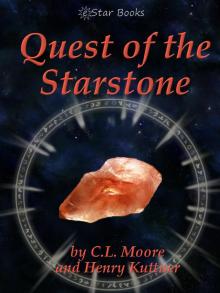 Quest of the Starstone
Quest of the Starstone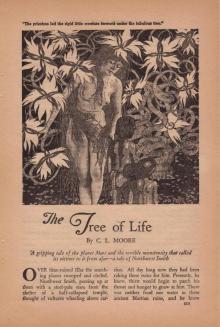 The Tree of Life
The Tree of Life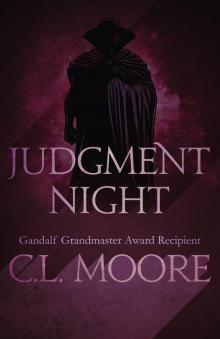 Judgment Night
Judgment Night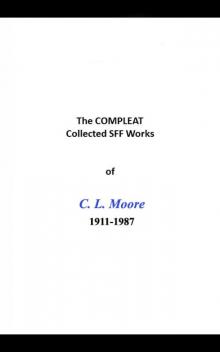 The COMPLEAT Collected SFF Works 1911-1987
The COMPLEAT Collected SFF Works 1911-1987 Northwest of Earth
Northwest of Earth No Boundaries
No Boundaries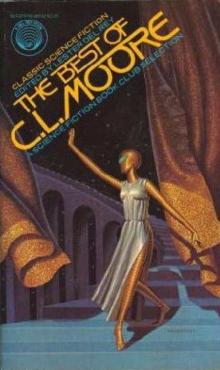 The Best of C. L. Moore
The Best of C. L. Moore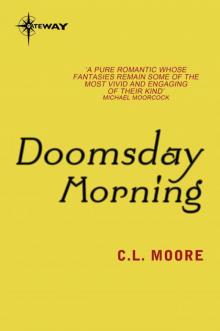 Doomsday Morning M
Doomsday Morning M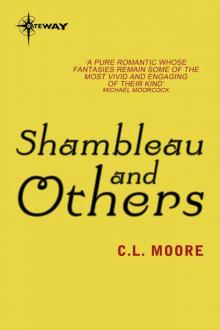 Shambleau and Others M
Shambleau and Others M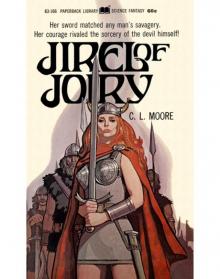 Jirel of Joiry
Jirel of Joiry Judgment Night M
Judgment Night M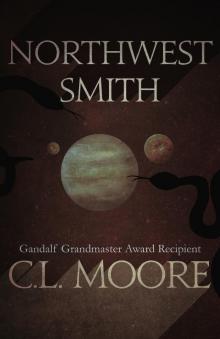 Northwest Smith
Northwest Smith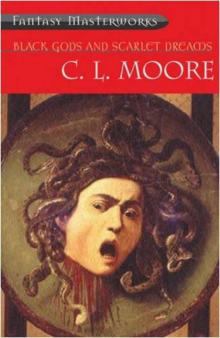 Black Gods and Scarlet Dreams
Black Gods and Scarlet Dreams